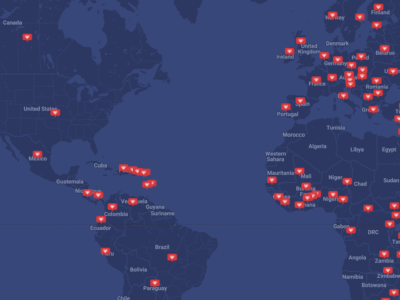Many datasets, analytical tools and large data repositories are available online. Below, we feature Q&As with experts and stories about data, as well as some of the free resources that might interest scholars, practitioners or students of the nonprofit sector.
Articles
Data resources available free online
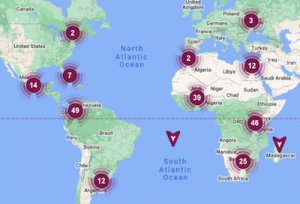 The Project Explorer is an open-access data resource of detailed information on a wide range of development, humanitarian, human-rights and gender-equality projects in Canada and the world, whether driven by Canadian funding or through Canadian organizations and their international and local partners. The Canadian Partnership for Women and Children’s Health (CanWaCH) leads it. The resource allows users to search, understand and improve the delivery of progressive programming for greater impact. In addition, the Analytics Portal allows users to visualize aggregated data provided in the Project Explorer. Leveraging information and evidence generated directly from the sector, this database connects users with timely information and multiple resources.
The Project Explorer is an open-access data resource of detailed information on a wide range of development, humanitarian, human-rights and gender-equality projects in Canada and the world, whether driven by Canadian funding or through Canadian organizations and their international and local partners. The Canadian Partnership for Women and Children’s Health (CanWaCH) leads it. The resource allows users to search, understand and improve the delivery of progressive programming for greater impact. In addition, the Analytics Portal allows users to visualize aggregated data provided in the Project Explorer. Leveraging information and evidence generated directly from the sector, this database connects users with timely information and multiple resources.
 The State Funding for Social Movements project was a five-year study that examined the history of state funding for social movements in Canada. It produced a searchable database of 20,000 pages of federal government records and of records from British Columbia and Nova Scotia regarding grants to organizations for Aboriginal peoples, the environment, human rights and women.
The State Funding for Social Movements project was a five-year study that examined the history of state funding for social movements in Canada. It produced a searchable database of 20,000 pages of federal government records and of records from British Columbia and Nova Scotia regarding grants to organizations for Aboriginal peoples, the environment, human rights and women.
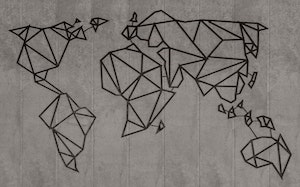 The Pew-Templeton Global Religious Futures Project (GRFP) examines world religion, including population distributions, restrictions on religion, religiosity, and other attitudinal measures across nations. The site includes visualizations, country-level analyzes, and links to source data. Pew also provides additional data useful for the study of religion. These datasets include surveys conducted in the US and Europe, surveys focused on particular faiths and data on the presence of religious restrictions.
The Pew-Templeton Global Religious Futures Project (GRFP) examines world religion, including population distributions, restrictions on religion, religiosity, and other attitudinal measures across nations. The site includes visualizations, country-level analyzes, and links to source data. Pew also provides additional data useful for the study of religion. These datasets include surveys conducted in the US and Europe, surveys focused on particular faiths and data on the presence of religious restrictions.
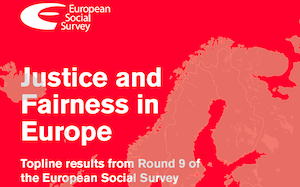 In 2020, the European Social Survey (ESS) published a report on Justice and Fairness in 27 European countries and created an online analysis tool that provides the source data used in the report. These are part of the Perceptions of Inequalities and Justice in Europe project, located at the German Institute for Economic Research. Survey results include respondents’ attitudes toward their societies and political systems, their prospects in society, and their beliefs about equity. Data documentation includes required weighting mechanisms, response rates by country, and notes on data usage.
In 2020, the European Social Survey (ESS) published a report on Justice and Fairness in 27 European countries and created an online analysis tool that provides the source data used in the report. These are part of the Perceptions of Inequalities and Justice in Europe project, located at the German Institute for Economic Research. Survey results include respondents’ attitudes toward their societies and political systems, their prospects in society, and their beliefs about equity. Data documentation includes required weighting mechanisms, response rates by country, and notes on data usage.
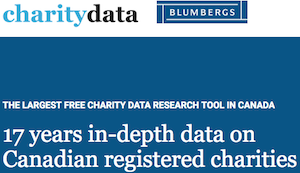 As part of the Sean Blumberg Transparency Project, Blumbergs Segal LLP maintains a searchable research tool of Canadian charities’ annual tax filings. The search function allows users to select based on size (in revenue), location and other categories. It provides visualizations of top-line financials, historic data, gifts received and made, as well as searchable trustee data for Canadian charities. Perhaps most importantly, this database includes up to 17 years of data per organization, allowing users to examine charities’ financial histories beyond the five years available through the charities listing of the Canada Revenue Agency (although this source includes the most recent available data).
As part of the Sean Blumberg Transparency Project, Blumbergs Segal LLP maintains a searchable research tool of Canadian charities’ annual tax filings. The search function allows users to select based on size (in revenue), location and other categories. It provides visualizations of top-line financials, historic data, gifts received and made, as well as searchable trustee data for Canadian charities. Perhaps most importantly, this database includes up to 17 years of data per organization, allowing users to examine charities’ financial histories beyond the five years available through the charities listing of the Canada Revenue Agency (although this source includes the most recent available data).
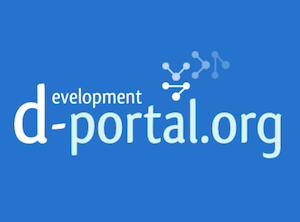 The International Aid Transparency Initiative enhances the transparency of global development and humanitarian efforts. IATI has resources for both new and sophisticated users, including a multi-lingual portal with tools for visualization and project summaries that contain information on the nature of projects funded, funding periods, and project locations. For more advanced users, IATI also maintains a data registry and a documented API for structure queries with the capability to export data in a variety of formats.
The International Aid Transparency Initiative enhances the transparency of global development and humanitarian efforts. IATI has resources for both new and sophisticated users, including a multi-lingual portal with tools for visualization and project summaries that contain information on the nature of projects funded, funding periods, and project locations. For more advanced users, IATI also maintains a data registry and a documented API for structure queries with the capability to export data in a variety of formats.
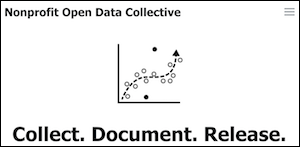 The Nonprofit Open Data Collective is a group of organizations, experts, practitioners and scholars working to increase access to data. The group’s website provides research-ready datasets, tools for analysis and links to other resources. The research blog, administered by scholar Jesse Lecy of Arizona State University, highlights new developments relevant to nonprofit data, including tools for text analysis, new databases and studies of interest.
The Nonprofit Open Data Collective is a group of organizations, experts, practitioners and scholars working to increase access to data. The group’s website provides research-ready datasets, tools for analysis and links to other resources. The research blog, administered by scholar Jesse Lecy of Arizona State University, highlights new developments relevant to nonprofit data, including tools for text analysis, new databases and studies of interest.
 As part of the Giving in the Netherlands Panel Survey, Rene Bekkers, Evelien Boonstoppel, Arjen de Wit Suzanne and Felix Claire van Teunenbroek provide datasets about giving and volunteering in the Netherlands from 1995 to the present. The data is the result of multiple waves of representative samples and includes information on household giving, individual giving, and volunteering, as well as attitudinal and demographic data.
As part of the Giving in the Netherlands Panel Survey, Rene Bekkers, Evelien Boonstoppel, Arjen de Wit Suzanne and Felix Claire van Teunenbroek provide datasets about giving and volunteering in the Netherlands from 1995 to the present. The data is the result of multiple waves of representative samples and includes information on household giving, individual giving, and volunteering, as well as attitudinal and demographic data.
 Ji Ma from the University of Texas has created a tool for classifying charities in the United States. The tool analyzes text with machine learning to categorize charities in the US, and it improves on existing taxonomies by recognizing the dynamic nature of charitable organizations and their capacities to engage in operations beyond one traditionally defined area of service.
Ji Ma from the University of Texas has created a tool for classifying charities in the United States. The tool analyzes text with machine learning to categorize charities in the US, and it improves on existing taxonomies by recognizing the dynamic nature of charitable organizations and their capacities to engage in operations beyond one traditionally defined area of service.
 Awesome public datasets is a repository of open data assets in a wide range of areas, from museum collections to government grant recipients. They include many excellent sources of Canadian data in domains ranging from Agriculture to Healthcare to Transportation.
Awesome public datasets is a repository of open data assets in a wide range of areas, from museum collections to government grant recipients. They include many excellent sources of Canadian data in domains ranging from Agriculture to Healthcare to Transportation.


